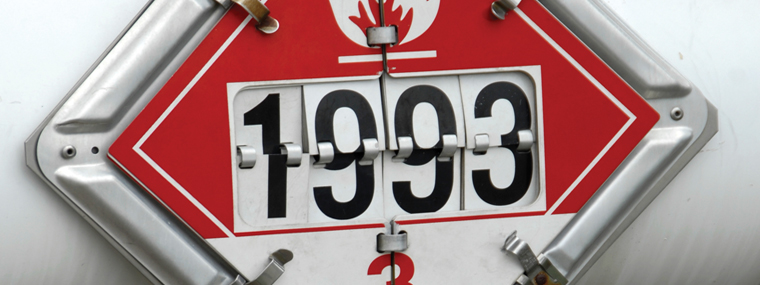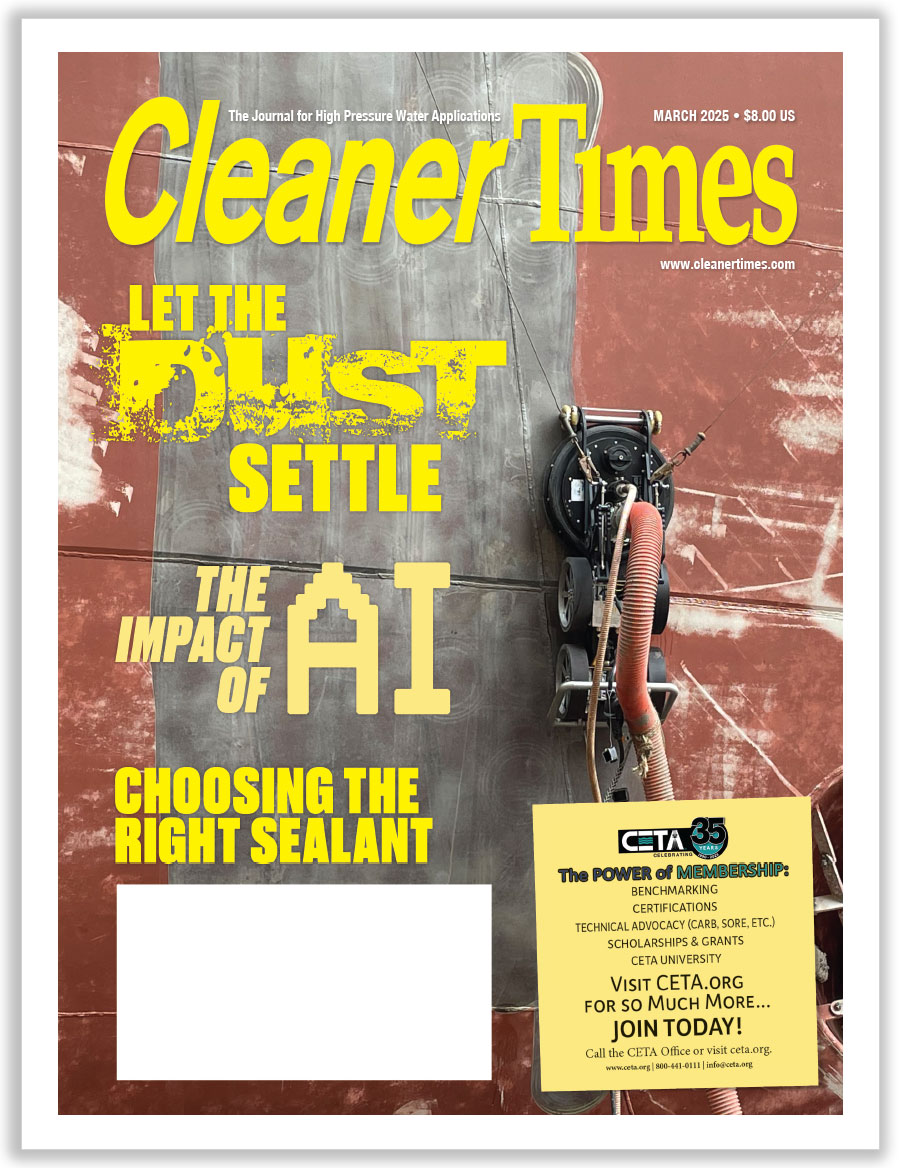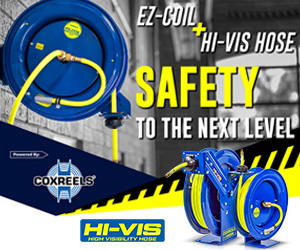
CETA Edge: Options for Certification
By Diane M. Calabrese / Published November 2015

Above and beyond licensing, which is required by controlling legal authorities or professional credentialing entities, there are many options for certification. Typically (to date anyway), whether or not to obtain certification is left to the discretion of the professional.
A professional or a business can meet all the requirements of certification without getting certified. To do so, though, means to be unnecessarily quiet about accomplishments.
“Certification helps you sell your equipment and your company,” says Roy G. Chappell, CEO of Chappell Supply and Equipment in Oklahoma City, OK. In addition to being CETA certified and UL 1776 certified, the em-ployees at his company have as many as 10 other certifications, which include HAZWOPER (Hazardous Waste Operations and Emergency Response Stan-dard) and working in confined spaces.
“We take CETA certification very seriously,” says Chappell. “It’s on every quote we send out.”
Sales prospects want to see certification, explains Chappell. “The bigger the companies are, the more certifications they want to see [before they commit to a vendor].”
“You want your certification to show through on the customer’s radar,” says Chappell. “It helps eliminate the competition.”
In fact, Chappell’s company recently got a job in the six figures because of certifications already in place. The installation his company did on that job led to a referral and a bigger job with another firm.
“Each dealer has a different outlook,” says Chappell. “It depends on the five to 10 year outlook for their company. Manufacturers have a five to 10 year outlook.” Everyone should, he explains.
As for licensing, Chappell believes that it is the future. Anyone selling equipment will have to be licensed at some point not very far down the road, he explains. Licenses will be predicated on the objective measures that are built into certification processes—and on certifications.
Communicate
“Certification is important when it gets you a couple of more sales against the competition,” says Bill Sommers, president of Pressure Systems Indus-tries in Phoenix, AZ. “It also seems to be more important with government agencies.”
Sommers’ company is CETA certified. He gets the word out that it is. “Our uniforms indicate being CETA certified,” he explains. “We also include it on our printed quotes.” Printed on quotes, too, is UL 1776 certification.
Indeed, currently, it is UL Stan-dards that are recognized most widely. Many members of the Cleaning Equipment Trade Association (CETA) would like to see that change.
“Manufacturers meeting UL standards or Canadian standards for safety, I would regard as being the most important,” says Timothy A. Pacen, owner of Absolute Pressure Washers in Odenton, MD. “CETA performance standards should also be important, but since only a small amount of manufacturers participate, the standards have little meaning.”
Dennis Black, president of McHenry Pressure Cleaning Systems, Inc. in Frederick MD, has an assessment that is similar. “I believe the UL requirements hold the most weight or prestige,” he says. “Certainly our customer will recognize those the most.”
For his part, Black would like to see CETA performance standards adopted without hesitation. And he wishes customers would recognize the certification. “But honestly they do not; we usually have to explain to them what it means,” he says.
The unawareness of the performance standards established by CETA is unfortunate, explains Black. He especially appreciates that the CETA performance standards eliminate the practice established of rounding. As such, if a machine is capable of 3.5 gpm, it is 3.5 gpm and not 4 gpm. If a unit delivers 3700 psi, it is 3700 psi and not 4000 psi.
The glaring example of variance that was once tolerated in describing pressure washers owes itself to “somewhere in the past someone decided it was okay to represent the performance of specifications of pressure washers incorrectly,” explains Black. That all has changed with the CETA Perfor-mance Standard, CPC100. See the last section of this column for more about CPC100.
Customer Responsibility
When an end user is buying machines and ancillaries, the individual should look for certification. “That the equipment meets UL standards, CETA performance standards, and is being purchased from a CETA-certified distributor” are all things the end user should verify, says Black. “The verification should provide a customer with good equipment that is supported by a professional distributor.”
Unfortunately, says Pacen, there is too often a lack of due diligence on the part of customers. “Very few end users seem to look at a distributor’s qualifications anymore, or don’t consider the value of having a professionally trained distributor on their side,” he explains.
The virtual world has compounded the problem. Via the Internet, it’s easy to purchase and to extract promises that are not fulfilled.
An undesirable cycle can result from the foregoing scenario. With end users not being aware of the importance of certifications, it has become less important to some distributors to get certified, says Pacen.
Not seeking out documented competencies, however, can come with a high price—literally. A buyer should be able to answer an important question affirmatively before buying, says Pacen. “Does the distributor have the ability to back the equipment after the sale with technical knowledge and in-house parts supply?”
Downtime is an anathema to contractors. An inoperable pressure washer cannot bring in the hourly rate for washing. There’s a genuine loss. The repair adds a cost. Do it yourself and there’s still a cost—time (and money further lost from not being on a job).
For end users who have purchased from certified distributors, there is a much shorter turnaround when equipment needs a repair. Parts are on the shelf. The distributor is keen to respond as quickly as possible to customers that purchased there. It’s a cycle that Pacen explains to prospective customers in the concrete terms of actual dollars.
Certified distributors are “higher priced for good reason,” says Pacen. They will be there for their customers with the expertise and the parts to keep the customer earning money, not experiencing downtime.
Black, too, suggests that distributors take the time to point out the value that buying from a certified dealer adds to the purchase. “Hopefully, CETA as an organization will continue to work to make CETA certifications be more recognized by the buying public,” he says.
Complexity
The importance of certification is not disputed. “It offers legitimacy to equipment, supplier, etc.,” says Black. “We know that the equipment we are offering will meet safety and performance aspects that the customer may require or be concerned about. Hopefully it offers a higher level of protection from liability if a problem occurs.”
Even with the positives of certification so well understood in the industry, there is complexity. One dimension of the complexity that must be better addressed is the value of certification. Pacen says he would like to see manufacturers and distributors who are CETA Performance Certified put more energy into “promoting what CETA is about.”
The promotion will counter some of the other vexing issues connected to obtaining certification. Distributors, for instance, must decide which certifications to obtain within the constraints of time available to them. In fact, Pacen would like to see distributors be able to avail themselves of more certifications. He cites service schools given by manufacturers and suppliers. A problem is that the schools are often not open to “the distributors in the field that need them even more” than those who are eligible to participate.
“Being CETA certified was something distributors aspired to become,” says Pacen. In the present, though, he expresses the concern that too few manufacturers “are on board.”
So much so that alternative certifications developed. “Some manufacturers…established their own group with standards—mostly homeowner-quality units…,” says Pacen. The alternatives make CETA certification less important than it ought to be.
CPC100, CETA Performance Standard
The CETA Performance Standard, CPC100, reflects a uniform method for testing and rating pressures. (Read the standard by getting the full text at ceta.org/Media/Default/PDF/CETA_CPC100_Performance.pdf).
Pressure washers that are determined to meet CPC100 will have been evaluated with the same set of criteria and by a third party. Consistency in terminology and in testing procedures used in the evaluation guarantee there is universal meaning in having met the criteria.
CETA Performance Certification based on CPC100 is expected to raise the visibility of CETA members and to give the members leverage in a competitive industry. The CPC100 aims to bring not only uniformity to testing, but also to ascertain that the uniformity derives from objective-based standards.
CPC100 applies to portable, stationary and fixed pressure washers in which the discharge line is hand-supported and manipulated and built for household/retail or commercial/industrial application as defined by UL 1776. (The standard does not apply to propane-powered engines.)




